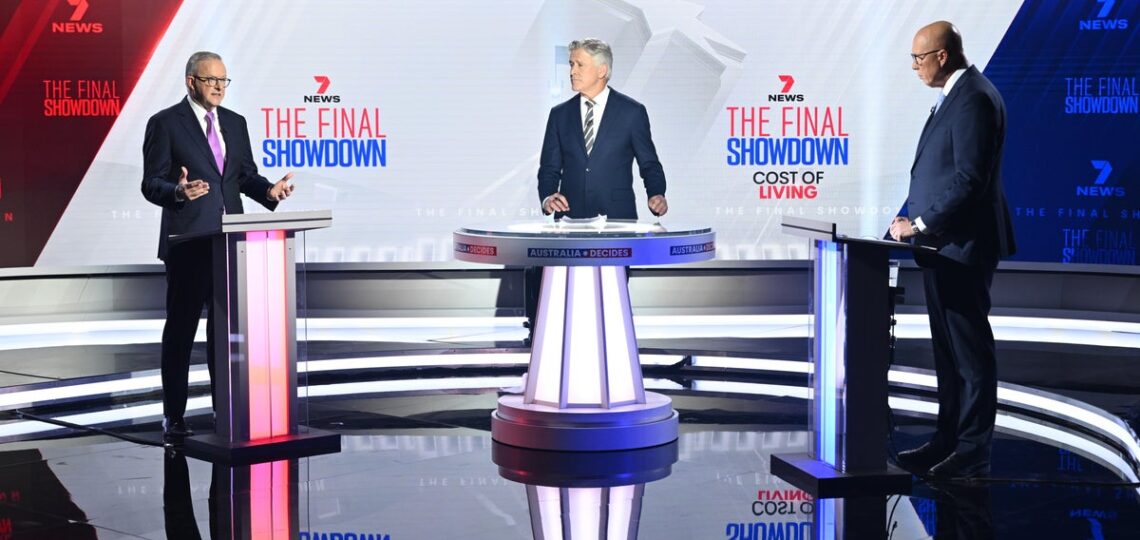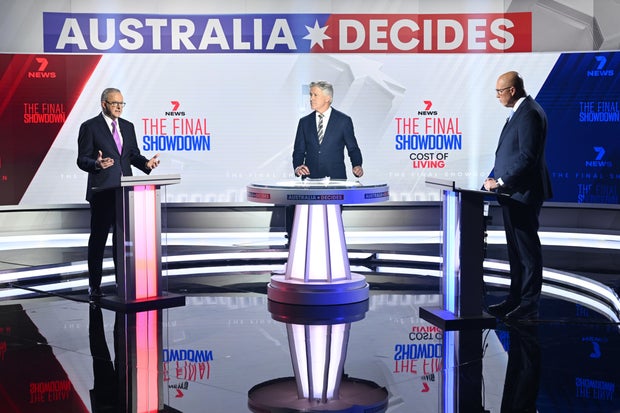
Australians voting in national election as Trump’s influence looms
Australians are voting in a national election this weekend, and President Trump appears to be playing an outsized role as nations continue to respond to the vision of U.S. foreign policy he’s put in place in the first 100 days of his second term.
Polling stations on the eastern coast of the country, which includes Sydney and Melbourne, opened Saturday at 8 a.m. local time and close at 6 p.m. (4 a.m. ET on Saturday). In Western Australia, which includes Perth, the poll closing time comes two hours later.
Australia’s vote comes just a week after Canada’s elections, where Mr. Trump’s influence was also felt. Canadian Prime Minister Mark Carney — whose numbers spiked as he pushed back against tariff threats and Mr. Trump’s jibes about annexing Canada into a “51st state” — crushed Pierre Poilievre’s hopes to return the Conservative Party to power after a decade of Liberal Party rule.
The center-right Liberal-National Coalition in Australia led the polls for nearly a year and had seemed to be on a path to form a government. Since Mr. Trump took office in January, however, the coalition’s support has plummeted, and it now trails the Labor Party by 4.4 points, according to YouGov.
Opposition leader Peter Dutton has run a campaign echoing Mr. Trump’s messaging focusing on the economy. His Liberal Party, whose motto is “Let’s get Australia back on track,” proposed cutting government waste and mandating federal workers return to the office.
“It was literally as if Dutton was copying what the United States government was doing, and I think as such, that ended up being enormously unpopular,” Alan Tidwell, a professor of Australian, New Zealand and Pacific studies at Georgetown University, told CBS News on Friday.
The economic downturn in Australia in recent years in the wake of the pandemic initially threatened center-left Prime Minister Anthony Albanese’s prospects of remaining in power. But Dutton’s similarities to Mr. Trump and the U.S. president’s growing unpopularity among the Australian public seem to have boosted Albanese’s chances.
Still, Albanese has embraced a moderate approach to Mr. Trump, refraining from criticizing him directly. When asked during a debate last month whether he trusts Mr. Trump and Chinese President Xi Jinping, Albanese said he had “no reason not to” trust either leader and said in a separate radio interview that he would speak with Mr. Trump after the election, should he win.
“I assure you I’m not staying up at night trying to ring anyone at the moment,” Albanese said.
LUKAS COCH / Getty Images
But Tidwell told CBS News that even if tariffs were reversed, Mr. Trump’s unpopularity in Australia would still impact the election. “It’s not saving Labor to the point where they can win an outright majority, but I think that they will win office with a minority government,” he said.
Australia is among several nations with which the U.S. does not have a trade deficit, according to the Office of the U.S. Trade Representative. The two nations signed the Australia-United States Free Trade Agreement in 2004, and it took effect on Jan. 1, 2005. Last month, Sen. Mark Warner, a Democrat from Virginia, asked U.S. trade representative Jamieson Greer why Australia was included on Mr. Trump’s tariff list.
“The idea we are going to whack friend and foe alike undermines our national security and, frankly, makes us not a good partner going forward,” Warner said.
The U.S. was Australia’s second-largest trading partner after China in the 2023-24 financial year, according to the Australian Department of Foreign Affairs and Trade. While it is unclear if American tariffs would prompt China to fill the gap, Beijing’s increased presence in the Indo-Pacific is considered a national security threat by Canberra.
The Australia, U.K. and U.S. trilateral security partnership
Australia and the U.S., along with the U.K., also share a close national security relationship, known as AUKUS, which was formalized in 2021. The trilateral security partnership also allows Australia to obtain Virginia-class nuclear submarines, which are expected to join the Royal Australian Navy’s fleet by the early 2030s.
Nishank Motwani, senior fellow and director of alliance strategy at the Australian Strategic Policy Institute USA in Washington, D.C., told CBS News that AUKUS matters a lot to Australia’s defense capability, but it needs to show the Trump administration how Canberra is being a responsible ally when it comes to defense spending to counter China.
“With a more influential China, which is more coercive and aggressive in the way in which it is just carrying out its affairs in the Indo-Pacific, Australia needs to do more as a way to push back against China’s ability to carve out its sphere of influence,” Motwani said.
As the Trump White House redefines America’s leadership role abroad and imposes tariffs on allies and adversaries alike, only 36% of Australians expressed any level of trust in the U.S. “to act responsibly in the world,” according to the Sydney-based Lowy Institute, whose survey in April also noted this was a “new low in two decades” of its polling.
“The level of distrust has certainly shot through the roof,” Tidwell said. “But I think that Donald Trump’s launch of the trade war and his other comments about Canada and the Panama Canal and Greenland have all really upset the apple cart, and Australians are really wondering, what does the future hold?”
